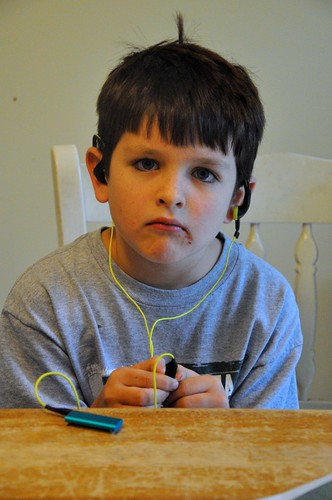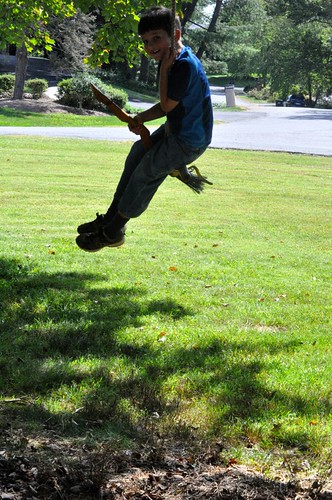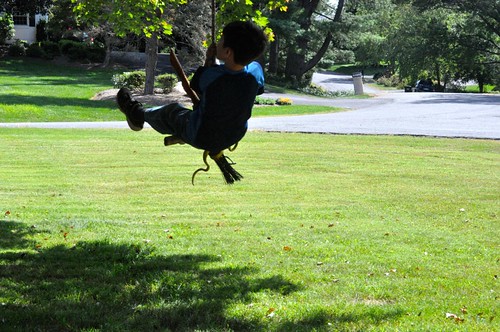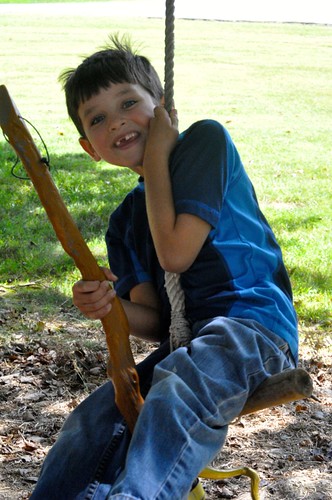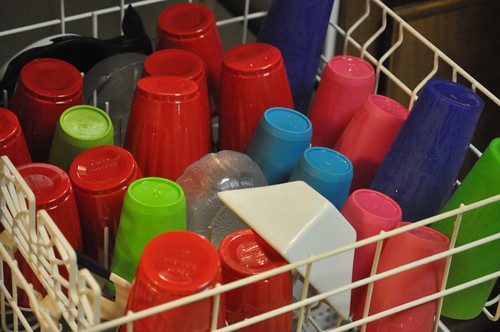Last year,
soon after I wrote this post, my sister sent the children a Nintendo DSI. It had been her son's and since he had received something new, he wanted to pass it on to his little cousins. I wasn't at all keen on them having it because I'd noticed that our children are quickly obsessed with electronics. Especially our boys.
I know the story of the forbidden fruit, but here's the thing: If we allowed our kids to play video games as much as they wanted, I'm fairly convinced that is all they'd do. Even when Charlie and I have moments of cool parent'ness and let them play Wii on weekend mornings, they'll be down there at 6 AM and we have to PRY them off it, hours later to do something totally necessary like, say, eat breakfast. And when we do pry them off it, they are cranky and angry and totally unpleasant.
Maybe one day they could play for an hour and just turn it off on their own volition.
But for our children, that day isn't today.
We host a Sunday small group at our house and two of the boys who attend are approximately the same age as our boys. Each week, they would bring their Nintendos to play. So after a month of pleading, I finally made the concession that on Sundays, ONLY, the boys could play with the DSI. Singular. There was only one, so they'd have to cooperate and take turns. What typically happened was that William would monopolize the game and Henry would be somewhat content to watch. As for the girls, they weren't at all interested and would rather play dress up or ride bikes in the yard.
What I noticed during the next several weeks of allowing them this opportunity to play the Nintendo, is that their personalities changed. Instead of engaging with our guests that would come to the house, they'd be completely zoned out on a computer game. And maybe I'm just hypersensitive but it felt like whenever they had quiet time at home, even on the perfectly beautiful blue sky days ... all they wanted was to play that little handheld. Instead of their imaginative spirits that would take flight and build forts out of cushions, they were grumpy and aggressive with each other, and with me.
So very soon, I wasn't too happy about having the Nintendo in the house and was regretting my decision to let them play with it at all on that one day per week.
One day after school, I was home from work with the children and we sat down together and made the most amazing marble run. We were talking and laughing and enjoying a snack together, when all of a sudden, William subtly notices that Henry is MIA. I'm not fully conscious of William looking for his little brother, until I hear Henry screaming from the other room.
Henry had disappeared from our little fiesta and tip toed in to the bedroom looking for the Nintendo that William had hidden somewhere. He found it under the bed and had crawled under there to inspect the game in peace. But William blew his cover by seeking him out and when he found him, he grabbed him by one foot and yanked him out from underneath the bed. On the way out, Henry smacked his head on the frame and was crying as William pulled the Nintendo out of his hands and yelled, "YOU CAN'T TOUCH THIS, IT'S MINE!"
By the time I arrived on the scene, Henry was hysterical, William was hysterical and I was ticked off beyond belief that a little plastic electronic device had caused such turmoil in what moments earlier, had been a picture perfect moment. So I did something that I'm only slightly ashamed to admit.
I took the Nintendo away from them and lifting it over my head, let it fall to the floor. Not once, not twice, but seven times. It eventually broke and I picked it up and threw the whole thing, games and all, in to the trash. As I did, I said to my astonished children, "Remember this ... PEOPLE not THINGS are what matter in this family."
During a conversation with my mother, I confessed what I had done. It wasn't my proudest moment, I know I could have handled it better and I thought I swore her to secrecy, but maybe not because the story got back to my sister who had given us the Nintendo. She told her son, who called me and asked me, "Aunt Jenny, did you really break my Nintendo and throw it out?"
Um, yes. And perhaps if I'd been in a better place, I would have made a more rationale choice like donating it to the Children's Hospital. But in that MOMENT, my central processing unit wasn't working so well and looking back, I can hardly blame my children for losing their cool when I so colossally lose mine.
But the fact remains - I do not want our children consumed with electronic devices. I know it's inevitable and one day I'll have to come to terms with that as they navigate technology. Or maybe it's hypocritical because Charlie and I have five computers across the two of us, along with one iPad and two cell phones. But for what it's worth the only time I'm on the computer is for work, bill paying or to update my blog for posterity. (The whole family also uses it for live-streaming music, movies, and FaceTiming with family.) Technology is awesome! Technology is great!
But as for now and for the near future, the only electronics that our children have and can use WHENEVER THEY WANT are the ones that they make.
This is Henry's laptop, made of magnets.
This is Henry on his cell phone, also made of magnets.
This is Elizabeth's iPad made out of construction paper.
She has all kinds of apps that are totally awesome.
This is Pandora with all the different music she likes to listen to.
This is FaceTime.
And this is Angry Birds.
If you push the button of the application that you want to play, she'll reach inside the folded construction paper and pull out the appropriate item. I play Angry Birds with her all the time and you'd never guess, but it really is a total blast.
(For at least two minutes, and then we go outside to play, or read a book.)
